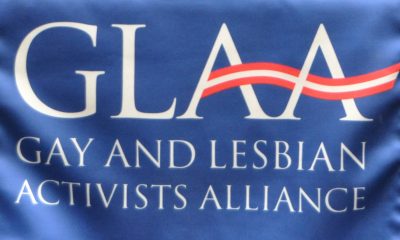Obituary
Law professor, LGBT rights advocate Joe Tom Easley dies at 81
Played key role in effort to repeal ‘Don’t Ask, Don’t Tell’
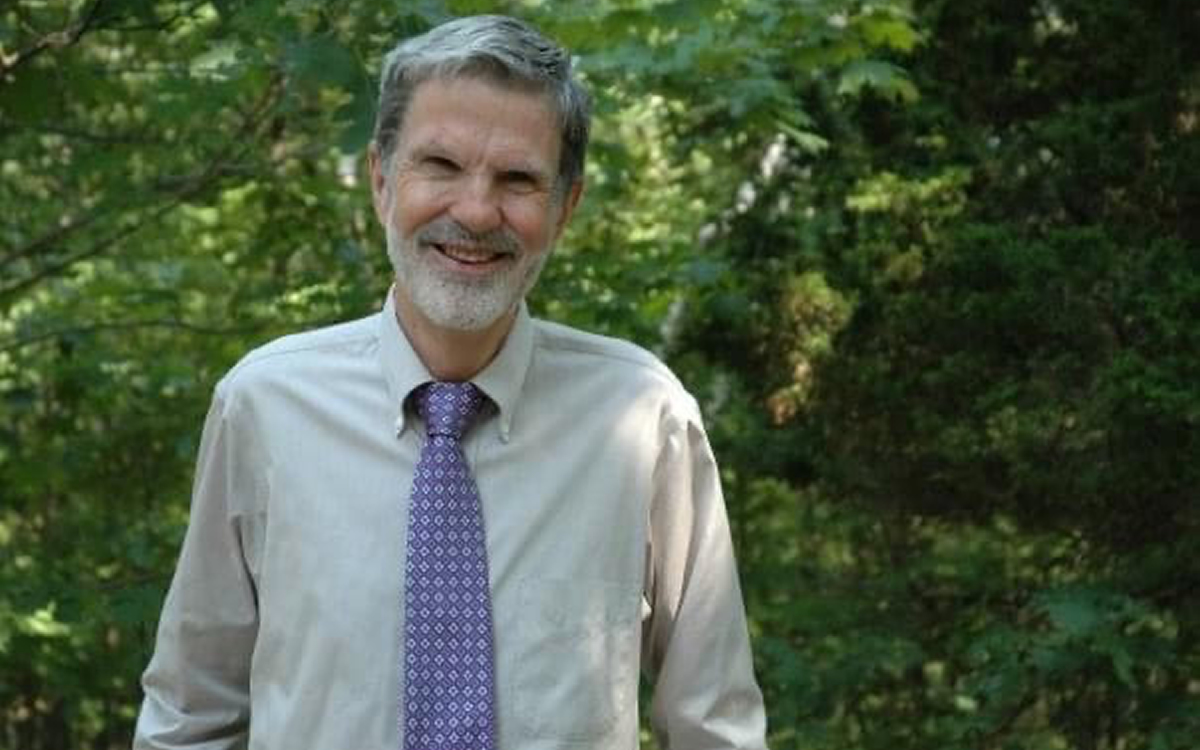
Joe Tom Easley, a nationally recognized attorney and LGBTQ rights advocate who taught at three U.S. law schools and served on the boards and in leadership positions at several national and D.C. LGBTQ and human rights organizations, died Feb. 13 at a hospital near his Miami Beach residence of complications associated with lung disease. He was 81.
Peter Freiberg, Easley’s husband and partner of 39 years, said Easley’s skills as a negotiator, speaker, teacher, and political strategist enabled him to serve as a volunteer advocate for LGBTQ and civil rights causes beginning in the late 1970s, when he began as a tenured law professor at American University Law School in D.C.
In 1978, according to Freiberg, Easley was appointed as an assistant dean at the A.U. Law School in addition to his teaching duties at a time when he came out as gay. “At that time, there were very few out university administrators,” Freiberg said.
From 1981 to 1983 Easley worked as a professor at the then-Antioch Law School in D.C., where he also served as an adviser to LGBTQ student groups. Antioch’s D.C. Law School later evolved into the University D.C. Law School.
Freiberg said that around the time Easley left Antioch in 1983 he began his affiliation as a lecturer with BARBRI, the nation’s largest training course and coaching program for law school graduates preparing to take their state bar exam.
“Based on student reviews, he was an extremely popular lecturer, making even his assigned, somewhat difficult subjects – contracts and real property law – interesting and enjoyable,” Freiberg said. He said the BARBRI organization arranged for Easley to travel to cities throughout the country to give his bar preparation lectures, usually in the months prior to when the winter and summer state bar exams are given for prospective lawyers.
He continued his lecturing with BARBARI until his retirement in 2013, Freiberg said.
Easley became active with D.C.’s Gay and Lesbian Activists Alliance from 1980 to 1982, according to Freiberg, and in 1982 Easley was elected as president of the Gertrude Stein Democratic Club, D.C.’s largest local LGBTQ political group. Freiberg said that around that time, then-D.C. Mayor Marion Barry appointed Easley as a member of the D.C. Police Civilian Complaint Review Board, which LGBTQ activists played a lead role in persuading the D.C. Council to create.
“Joe Tom was certainly a passionate, articulate and politically savvy champion of human rights in so many ways, most crucially in the fight to establish a Civilian Complaint Review Board,” said D.C. LGBTQ activist Craig Howell.
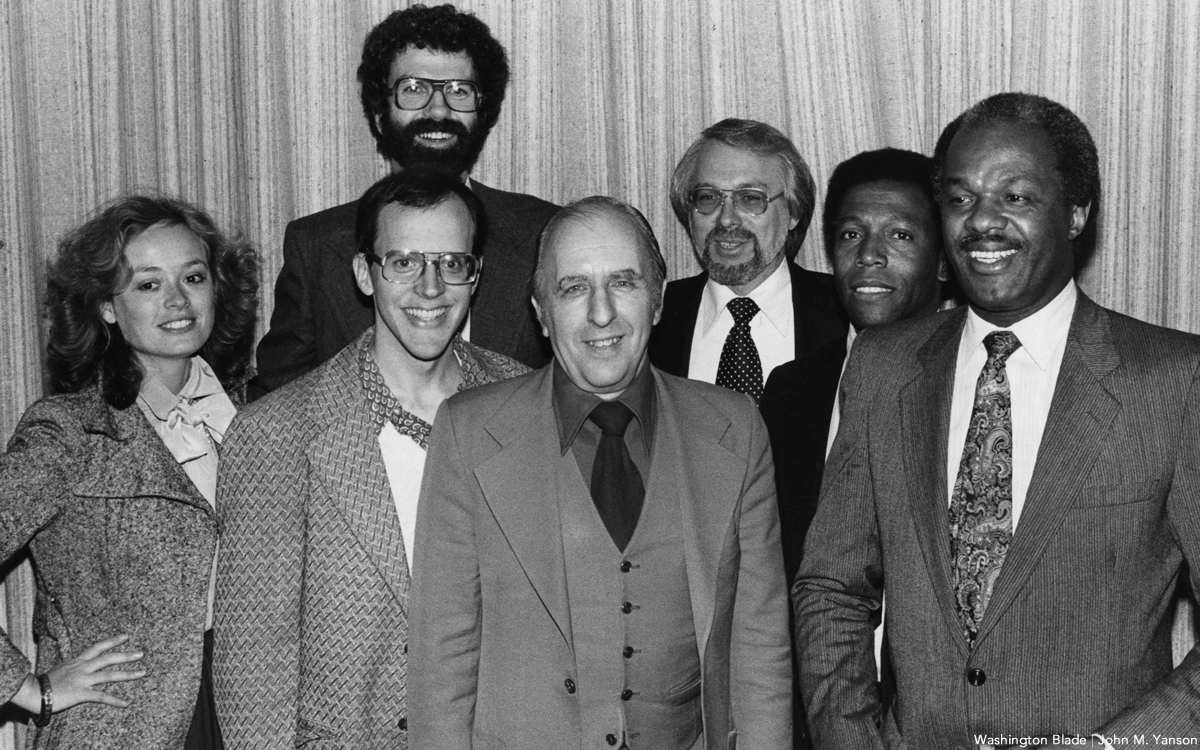
In 1983, Easley moved to New York City to live with Freiberg after the two became a couple that year. A short time later, Easley, while continuing his activism, enrolled in Yale University’s graduate school where he received a master’s degree in public health in 1986. Freiberg said Easley then taught public health law at Yale’s medical school part time for the next two years. During his time as a student and as a teacher at Yale, Easley commuted from Manhattan to New Haven four days a week, Freiberg said.
Easley, an only child, was born in Robstown, Texas, near Corpus Christi and spent his early childhood years in Truby, Texas, a small farming town where he started school in a one-room schoolhouse. His family moved to Eagle Pass, a Texas border city on the Rio Grande River in 1950, Freiberg said, where Easley graduated from Eagle Pass High School.
He received his undergraduate degree with a major in English from Texas A&M University in 1963. Freiberg said when Easley was about to be drafted during the Vietnam War in 1966, he enlisted in the U.S. Navy and served on a Naval intelligence base on a small island near the Alaska-Russian border.
“After a year, he was told that a friend who had propositioned him for sex before he ever joined the Navy informed the government that he was gay,” Freiberg said in recounting Easley’s brief period of military service. “His commander apologetically told him that he had no choice but to kick him out—all gay people were barred from serving—but that because of his exemplary service he would ensure Joe Tom received an honorable discharge and veteran benefits.”
His Navy benefits through the longstanding G.I. Bill veterans’ education program helped to pay Easley’s tuition at the University of Texas School of Law in Austin, where he received his law degree.
During and shortly after his law school years Easley became involved with the anti-Vietnam War movement and during summer breaks as a law student became involved with the first group of Ralph Nader’s, “Nader’s Raiders” drawing attention to government and corporate malfeasance, according to Freiberg.
After law school Easley served as a law clerk for a federal judge in Boston from 1971 to 1972 before serving as an assistant professor for the next two years at the University of Georgia Law School in Athens, Freiberg said.
Easley next left for Europe in 1975, where he worked for the Brussels-based European Bureau of Consumer Organizations. Among other things, he assisted with an investigation of price-fixing by pharmaceutical companies.
Freiberg recalled that over the course of his career Easley also taught part-time for short periods at the University of Virginia Law School and New York’s Cardozo Law School.
He said Easley’s devotion to LGBTQ equality and civil rights for other minorities, including African Americans, began in full force when he returned to the U.S. from Europe to begin teaching at American University in D.C.
In addition to his affiliation with local D.C. LGBTQ groups, over the next 30 years Easley became involved with and helped advance the work of a number of national LGBTQ organizations. Among them was Lambda Legal, the New York-based LGBTQ litigation group for which Easley served on the board of directors from 1981 to 1991 and as board co-chair from 1983 to 1987.
From 1988 to 1995 he served as president of the Human Rights Campaign Fund Foundation, which later changed its name to the Human Rights Campaign Foundation. He also served on the board of the Servicemembers Legal Defense Network (SLDN), a national group that assisted LGBTQ service members facing discharge from the military due to their sexual orientation or gender identity.
Freiberg said Easley’s own discharge from the Navy for being gay helped to solidify his commitment and dedication to the cause of LGBTQ service members.
With Easley’s active involvement, SLDN played an important role in the successful campaign to persuade Congress to repeal the “Don’t Ask, Don’t Tell” law, which continued to be used to discharge LGBTQ people from the military if their sexual orientation or gender identity became known to military authorities.
Freiberg said Easley’s skills as a public speaker on behalf of LGBTQ equality surfaced in 1988 when he delivered the closing speech before more than 200 LGBTQ leaders from across the country attending a “War Conference” in Warrenton, Va., called by AIDS activist Larry Kramer to draw attention to the continuing AIDS epidemic, anti-LGBTQ court decisions, and anti-gay vitriol by religious right groups.
In what he and Easley also considered a gesture in support of LGBTQ equality, Freiberg said he and Easley in 2003 traveled to Toronto to legally marry. Their wedding became what the couple believed to be the first same-sex wedding to be written about in the New York Times’s wedding celebration feature.
“We felt strongly that legal marriage would not make one bit of difference in our relationship, and it didn’t,” said Freiberg. “But we wanted to make a political statement that our love and devotion was equal to anyone else’s, and that gay couples deserved equality before the law, including benefits and responsibilities,” Freiberg said.
“His whole life was animated by a desire to work for social justice and to do good,” said Freiberg. “He supported the underdog, whether LGBT people, African Americans, an injured Iraqi boy or the disabled, which he was in his last three years.”
Freiberg was referring to the national news media attention Easley received in 2005, including a story in the New York Times, after he arranged for an Iraqi boy injured in Iraq by a U.S. bomb to be brought to the U.S. for medical treatment.
“Joe Tom Easley was a dear friend and mentor who taught me much about leadership, LGBT politics, the law and about giving,” said Vic Basile, former executive director of the Human Rights Campaign and a longtime LGBTQ rights advocate. “He led by example, giving generously of his time and broad knowledge to help others in need, never asking or expecting anything in return,” Basile said.
Easley was predeceased by his parents, Tom Lee Easley and Lady Hampton Easley.
He is survived by his husband and partner of 39 years, longtime journalist Peter Freiberg; his sister-in-law and brother-in-law Eileen and Barney Freiberg-Dale; his niece, Sabrina Freiberg-Dale; his nephew, Hunter Dale and fiancée Eve Lichacz; a cousin, Jane Hays; and many friends around the world.
Plans for a memorial service, including a memorial event in D.C., will be announced. Contributions in his memory can be made to Lambda Legal, the U.S. Holocaust Memorial Museum, and the National Parks Foundation.
District of Columbia
Acclaimed bisexual activist, author Loraine Hutchins dies at 77
Lifelong D.C.-area resident was LGBTQ rights advocate, sex educator
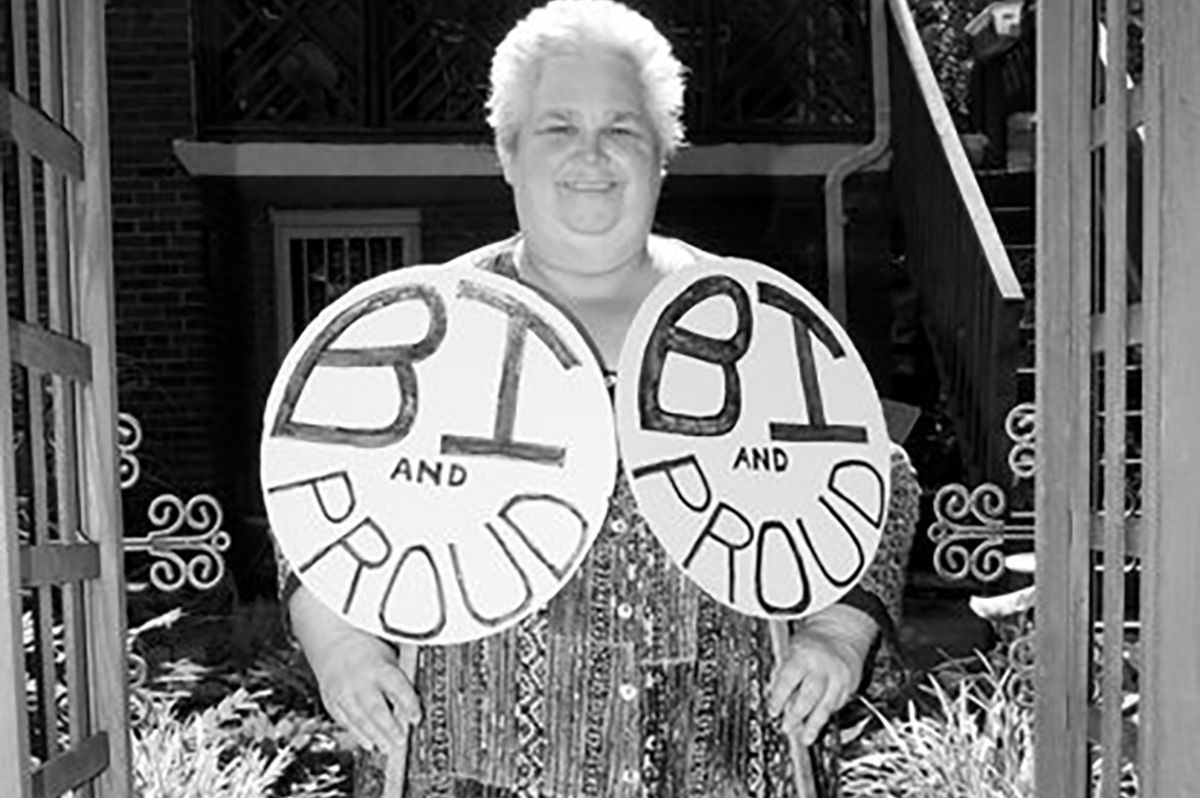
Loraine Adele Hutchins, a nationally known and acclaimed advocate for bisexual and LGBTQ rights, co-author and editor of a groundbreaking book on bisexuality, and who taught courses in sexuality, and women’s and LGBTQ studies at a community college in Maryland, died Nov. 19 from complications related to cancer. She was 77.
Hutchins, who told the Washington Blade in a 2023 interview that she self-identified as a bisexual woman, is credited with playing a lead role in advocating for the rights of bisexual people on a local, state, and national level as well as with LGBTQ organizations, many of which bi activists have said were ignoring the needs of the bi community up until recent years.
“Throughout her life, Loraine dedicated herself to working and speaking for those who might not be otherwise heard,” her sister, Rebecca Hutchins, said in a family write-up on Loraine Hutchins’s life and career.
Born in Washington, D.C., and raised in Takoma Park, Md., Rebecca Hutchins said her sister embraced their parents’ involvement in the U.S. civil rights movement.
“She was a child of the ‘60s and proudly recalls attending Martin Luther King’s ‘I Have a Dream’ speech with her mother on the D.C. Mall,” she says in her write-up. “She was steeped in the civil rights movement, was a member of the Student Non-Violent Coordinating Committee, and was proud to say she had an FBI record.”
The write-up says Hutchins received a bachelor’s degree from Shimer College in Mount Carroll, Ill. in 1970, and a Ph.D. in 2001 from Union Institute. It says she was also a graduate of the Institute for the Advanced Study of Human Sexuality’s Sexological Bodyworkers certification training program.
The family write-up says in the 1970s Hutchins became involved with efforts to assist tenants, including immigrant tenants, in affordable housing programs in D.C.’s Adams Morgan neighborhood.
“In 1991, she co-authored the groundbreaking book, ‘Bi Any Other Name: Bisexual People SPEAK OUT’ with friend and colleague Lani Ka’ahumanu,” the write-up says. It notes that the acclaimed book has been republished three times and in 2007 it was published in Taiwan in Mandarin.
According to the write-up, Hutchins delivered the keynote address in June 2006 at the Ninth International Conference on Bisexuality, Gender and Sexual Diversity. In October 2009, D.C.’s Rainbow History Project honored her as one of its Community Pioneers for her activist work.
“Loraine is one of the few people who has explained, defended and championed bisexuality and made sure the “B” got into the LGBT acronym,” the Rainbow History Project says on its website in a 2009 statement. “Sensitivity to bisexual issues, civil rights, and social justice issues is Loraine’s life work,” the statement concludes.
The write-up by her sister says that up until the time of her retirement, Hutchins taught women’s and LGBT studies as well as health issues in sexuality at Montgomery Community College and Towson University in Maryland.
“She was a friend and mentor to many in the LGBTQ community,” it says. “She thoroughly enjoyed adversarial banter on the many topics she held dear: sexuality, freedom of speech, civil rights, needs and support of those with disabilities, especially in the area of mobility, assisted housing, liberal politics and many other causes,” it points out.
She retired to the Friends House community in Sandy Springs, Md., where she continued her activism, the write-up concludes.
Hutchins was among several prominent bisexual activists interviewed by the Washington Blade at the time of her retirement in June 2023 for a story on the status of the bisexual rights movement. She noted that, among other things, in her role as co-founder the organizations BiNet USA and the Alliance of Multicultural Bisexuals, she joined her bi colleagues in prodding national LGBTQ advocacy organizations to improve their advocacy work for bisexuals, which Hutchins said had been inadequate in the past but had been improving in recent years.
Hutchins is survived by her sister, Rebecca Hutchins; her husband, Dave Lohman; nephew, Corey Lohman and his wife Teah Duvall Lohman; and cousins, the family write-up says.
It says a private memorial service was scheduled for December and a public memorial service recognizing her contributions to the LGBTQ community will be held in the spring of 2026.
Obituary
Acclaimed disability rights advocate Thomas Mangrum dies at 61
Lifelong D.C. resident also served as ‘cherished’ Capital Pride volunteer
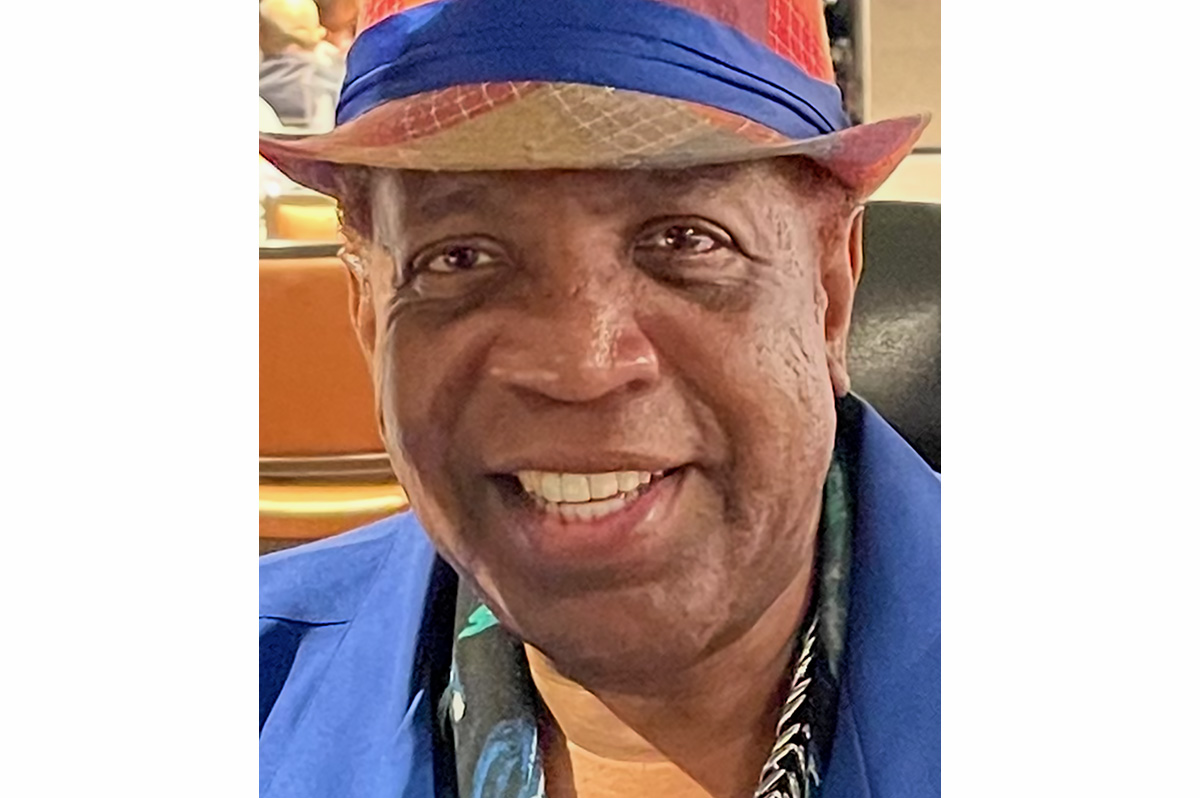
L. Thomas Magnum Jr., a lifelong D.C. resident, widely recognized and acclaimed advocate for people with disabilities, and LGBTQ rights activist involved in the city’s Capital Pride events, died Sept. 17 from complications related to stomach cancer. He was 61.
A statement released by Project ACTION!, a local disability advocacy organization for which Mangrum served for 15 years as co-president, says he worked for more than 20 years for the D.C.-based Maurice Electric Supply company before retiring in 2002 and devoting his efforts to disability-related projects and programs.
Phylis Holton, an official with the D.C. organization Quality Trust For Individuals With Disabilities and a longtime friend of Mangrum, said as a person with a developmental disability Mangrum devoted his life to supporting others with all forms of disabilities. She said that due to a separate spinal condition, Mangrum used a wheelchair for about 15 years prior to his passing.
Holton said Mangrum had a mild form of developmental disability, which the U.S. Centers for Disease Control and Prevention describes as “a group of conditions due to an impairment in physical, learning, language or behavior areas” that usually develops before a child is born during pregnancy.
Holton said Mangrum was an active member of Project ACTION! for 15 years prior to the 15 years he served as the organization’s co-president.
“He traveled nationally and presented at conferences, was featured on webinars and podcasts on a variety of topics related to self-advocacy, accessibility, equality, and more,” Holton told the Washington Blade in a statement.
“He shared his lived experience of being a Black man with a disability, and being gay, and how it impacted how he was treated in the community,” Holton said. “He was a strong advocate and co-facilitated trainings for independent advocacy organizations that Thomas supported and was a key advocate in their advocacy work,” she said.
Holton added, “He would answer a late request to train a group of attorneys, present at a meeting or testify before City Council or meet with an advocacy group to advance pending legislation that impacted people with disabilities.”
She said Mangrum also enjoyed participating in LGBTQ Pride events and last year traveled to the New York Pride events. According to Holton, he looked forward to participating in WorldPride 2025 events earlier this year in D.C. “but his illness prevented him from doing so.”
In a statement announcing Mangrum’s passing, Capital Pride Alliance, the group that organizes D.C.’s annual LGBTQ Pride events and served as the lead organizer of WorldPride 2025 in D.C., called Mangrum a “cherished volunteer” for D.C. Pride events.
June Crenshaw, the Capital Pride Alliance Deputy Director, said Mangrum served as a volunteer for D.C.’s LGBTQ Pride events “for many years” and was involved in many of the planning activities for WorldPride before his illness prevented him from participating in WorldPride earlier this year.
“He certainly in my interaction with him made me very aware of making sure that Capital Pride was thinking about accessibility always, and making sure that we had a welcoming, affirming accessible space for participants and staff with disabilities,” Crenshaw said.
In its statement on Mangrum’s career and accomplishments in life, Project ACTION! says he helped to advance the needs of people with disabilities through service on many boards and commissions. Among them were Lifeline Partnership, the D.C. Developmental Disabilities Council, the D.C. Center for Independent Living, the Washington Metropolitan Area Transportation Authority’s Accountability Advisory Committee, “and many more.”
“His leadership, passion, and unwavering commitment to equity and inclusion made a lasting impact on all who had the privilege to know and work alongside him,” the statement says.
It adds, “Thomas showed us the power of perseverance, courage, and the importance of standing together. His spirit will continue to guide us and strengthen our community for generations to come.”
A funeral for Mangrum was scheduled for Oct. 9, at D.C.’s Westminster Presbyterian Church at 400 I Street, S.W., with a viewing at 10 a.m. followed by a program at 11 a.m. A burial was scheduled to take place that same day at Heritage Memorial Cemetery at 13472 Poplar Hill Road in Waldorf, Md.
Holton said in lieu of flowers, donations may be made to Project ACTION! for a Celebration of Life and advocacy scholarship in Mangrum’s name. A date and location for the Celebration of Life for Mangrum was to be announced later, according to Project ACTION!
Obituary
Susan Xenarios, crime victim advocate, long-time LGBTQ ally, dies at 79
‘Susan was a force of nature, a mentor’
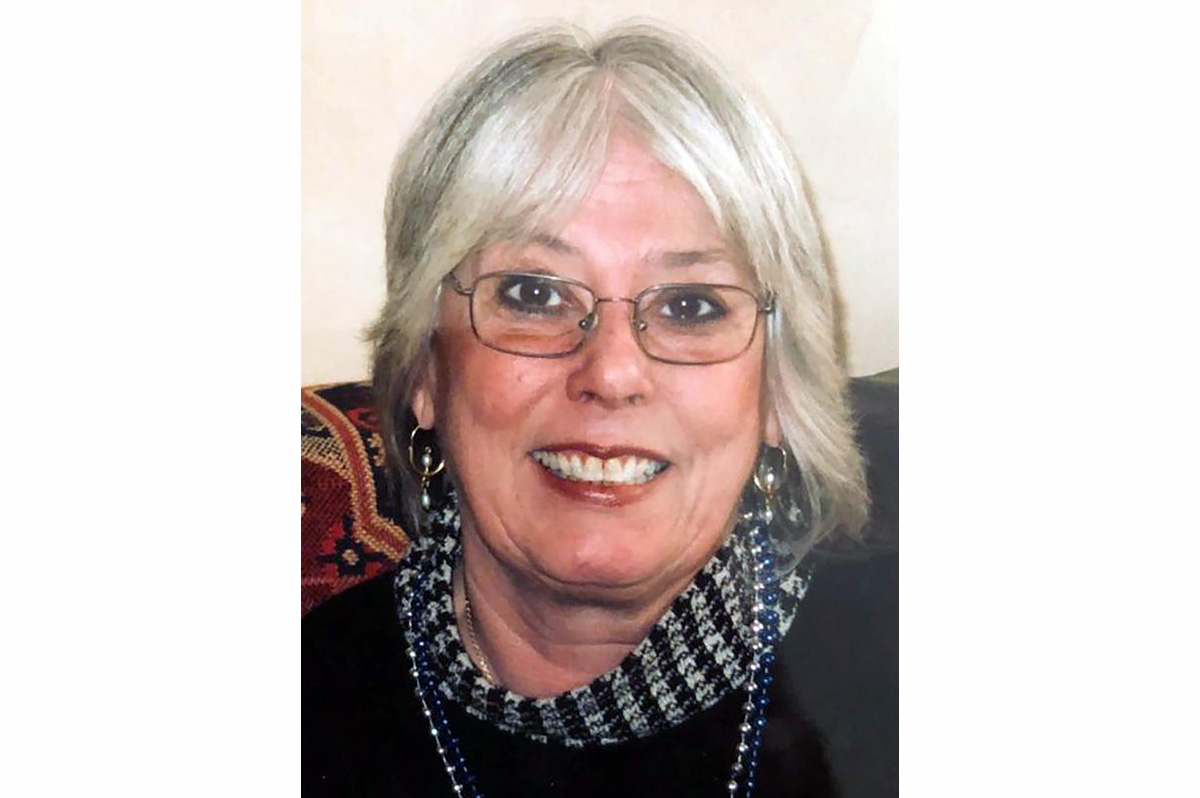
Susan Xenarios, LCSW, a visionary and dynamic leader of New York’s crime victim movement for 50 years and a courageous ally of the LGBTQ community, died on Sept. 6 in Manhattan. She was 79.
In 1974, an assailant held a knife to Ms. Xenarios’s throat and raped her on a rooftop in Upper Manhattan. At a time when few sexual assault victims spoke out, she began a lifelong, public campaign to improve the care and treatment of survivors and to reform laws and police procedures. Along with her high-profile advocacy, she never stopped counseling individual survivors of crime, pioneering breakthrough therapeutic interventions.
Ms. Xenarios led the creation of New York’s first program to provide assistance to survivors of sexual assault, the state’s first clinical program for male survivors, and the New York Sexual Assault Forensic Examiner (SAFE) Program, which ensures survivor-centered emergency room protocols, including evidence collection. She served as executive director of the Crime Victims Treatment Center in New York City for 40 years (1977 -2017).
Ms. Xenarios also was a driving force behind several state laws to advance the rights of crime survivors, including a 1993 law protecting the confidentiality of rape crisis center communications, the Hate Crimes Act 2000, which included enhanced penalties for hate-motivated crimes, including anti-LGBTQ assaults, and the 2015 “Enough is Enough” law, one of the first laws in the nation to require all colleges to adopt a set of comprehensive procedures for addressing sexual violence on campuses.
“Susan was a force of nature, a mentor, an extraordinary ally to the LGBT community, and a dear friend,” said Bea Hanson, director of the New York State Office of Victim Services, principal deputy director of the federal Office on Violence Against Women during President Barack Obama’s administration (2011-2017), and director of client services of the New York City Gay and Lesbian Anti-Violence Project (1991-1997). “She was a leader in advocating for the rights of sexual assault survivors and all crime victims. She spoke truth to power with a smile on her face and love in her heart. She will be missed.”
“Susan was the greatest champion and friend of LGBT victims of crime there ever was or ever will be,” said Matt Foreman, former executive director of the NYC Gay and Lesbian Anti-Violence Project (1990-1996) and the Empire State Pride Agenda (1996-2003). “She was one of the first to recognize the prevalence of sexual assault against men and she created the first program to help male survivors. When there was enormous pressure to pass a hate crimes law that did not include anti-LGBT offenses, she made sure the larger movement did not abandon us. She understood the harmful effects of having terms like ‘sodomy’ and ‘deviate sexual intercourse’ in New York State law and led the successful drive to purge them from the books. She was so genuinely warm and supportive, I was shocked when I learned that she wasn’t a lesbian.”
A memorial service will be held on Saturday, Sept. 20, at 11 a.m. at West End Collegiate Church, 245 W. 77th St. in Manhattan.
-

 New York4 days ago
New York4 days agoPride flag removed from Stonewall Monument as Trump targets LGBTQ landmarks
-

 Italy5 days ago
Italy5 days agoOlympics Pride House ‘really important for the community’
-

 Florida4 days ago
Florida4 days agoDisney’s Gay Days ‘has not been canceled’ despite political challenges
-

 Philippines4 days ago
Philippines4 days agoPhilippines Supreme Court rules same-sex couples can co-own property





